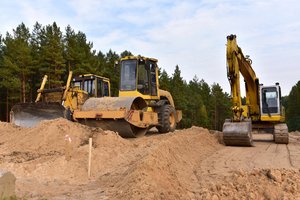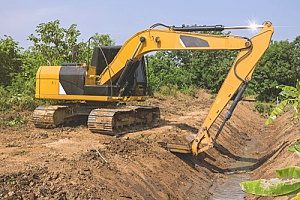Unearthing Excellence: Exploring the Benefits of Professional Excavation Services
When starting a construction project or property renovation, the first step involves clearing and preparing the land. Professional excavation services play a crucial role. Whether building a house, installing utilities, or designing a landscape, hiring experts ensures a smooth and efficient process.
Firstly, professional excavation services offer many benefits. Their experience and specialized equipment allow them to remove obstacles like trees, rocks, and old foundations quickly and safely. They dig trenches, foundations, and basements with precision, ensuring structural stability and longevity. Proper drainage and land grading prevent water damage and maintain soil integrity.
By choosing professional excavation services, you save time and avoid costly mistakes. Ensure the success of your project by trusting experts. For a solid foundation, rely on professional excavators to transform your land into the base for your dreams.
The Importance of Professional Service
In any construction project, the importance of professional excavation services cannot be overstated. Before building, the land needs clearing, leveling, and preparation for construction. Without proper excavation, the structure’s integrity may suffer, leading to future issues.
Professional excavation services remove obstacles like trees, rocks, old foundations, and debris. Experienced specialists safely and efficiently clear these obstacles, ensuring a clean space for construction.
Moreover, professional contractors dig trenches, foundations, and basements with precision, which is essential for structural stability. Improperly excavated foundations can cause cracks, settling, or even collapse. By hiring professionals, you ensure a solid foundation for your project.
Additionally, professional operators excel at drainage and land grading. Proper drainage directs water away from the structure, preventing water damage and foundation issues. Land grading shapes the land to achieve a level surface, important for water runoff, stability, and aesthetics. Professional contractors understand these factors and ensure the land is graded appropriately.
In summary, professional excavation services are vital for any construction project. They provide the expertise, equipment, and knowledge needed to clear and prepare the land properly. By hiring professionals, you can avoid potential issues, save time, and ensure your project’s success.
Advantages of Hiring Professionals
Hiring professional excavators for your construction project offers numerous advantages of delays or mistakes that could lead to increased costs. By adhering to project deadlines and minimizing disruptions, they ensure that the construction process stays on track, ultimately saving you money in the long run.
- Safety and Risk Mitigation: Excavation can be a hazardous process, especially when dealing with heavy machinery and potentially unstable ground conditions. Professional excavators prioritize safety and follow industry best practices to mitigate risks. They are trained to handle equipment properly, implement necessary safety measures, and adhere to regulations, ensuring the safety of workers and the surrounding environment.
- Quality and Precision: Excavation is a critical step in setting the foundation for any construction project. Professional excavators have the expertise to perform precise excavations, ensuring the stability and longevity of structures. Their knowledge of soil conditions, drainage requirements, and proper grading techniques allows them to create a solid foundation that withstands the test of time.
- Efficient Management of Site Conditions: Professional excavators are adept at assessing site conditions and adapting their excavation plans accordingly. They can identify potential challenges, such as underground utilities or environmental concerns, and develop strategies to overcome them. By efficiently managing site conditions, they minimize disruptions and optimize project timelines.
- Proper Waste Management: Excavation often generates a significant amount of debris and waste materials. Professional excavators have the resources and knowledge to handle waste management effectively. They can properly dispose of or recycle materials, ensuring compliance with environmental regulations and minimizing the impact on the surrounding ecosystem.
Types of Excavation
- Commercial Excavation: Prepares sites for buildings, shopping centers, or office complexes. It involves extensive earthmoving, site grading, and utility installations. Professional contractors ensure compliance with zoning regulations and optimize space use.
- Industrial Excavation: Supports large-scale projects like industrial complexes and infrastructure development. It includes earthmoving, foundation excavation, and utility system installations. Experts handle complexities to ensure safe project completion.
- Road and Highway Excavation: Focuses on constructing, repairing, or expanding transportation infrastructure. It involves land clearing, hill cutting, and drainage systems. Contractors work with civil engineers to meet project requirements.
- Residential Excavation: Prepares sites for home construction, involving land clearing, grading, and digging foundations. Experts ensure compliance with building codes and provide a stable base.
- Trenching Excavation: Creates narrow, deep trenches for utilities like water, sewer, gas lines, and electrical conduits. Precision and specialized equipment ensure proper placement.
- Pool Excavation: Involves digging and preparing sites for swimming pool installations, including soil removal and proper drainage. Contractors work with pool installers to create stable foundations.
- Drainage Excavation: Manages water flow, prevents flooding, and protects structures by digging trenches, creating swales, and installing stormwater systems. Professionals design effective drainage systems.
By understanding these types of excavation, you can choose the right service for your project needs, ensuring efficient and successful outcomes.
Common Excavation Techniques and Equipment
Professional excavators employ various techniques and utilize specialized equipment to complete excavation projects efficiently. Here are some common excavation techniques and the equipment used:
- Trench Excavation: long, narrow trenches in the ground to accommodate the placement of these utilities. Trenching requires careful planning and execution to avoid damaging existing utilities and ensure proper depth and alignment.
- Basement Excavation: Basement excavation is necessary for projects that require underground living spaces or additional storage areas. It involves digging a large space beneath the ground level to create a basement. Basement excavation requires expertise in slope stability, drainage, and waterproofing to ensure a safe and functional space.
- Grading and Landscaping: Grading and landscaping excavation focuses on shaping the land to achieve a desired slope, contour, or design. This type of excavation is commonly used in projects that involve creating gardens, outdoor spaces, or recreational areas. Grading and landscaping excavation require attention to detail and the ability to work with the natural terrain to achieve the desired aesthetic and functionality.
- Slope Stability: Provide stability to steep slopes using a technique that requires precise angles and spacing of steps to ensure proper support. This technique requires precision to ensure the correct angle and spacing of the steps.
- Shoring: Shoring is a technique used to provide temporary support to the excavation walls. It involves installing vertical or horizontal supports, known as shoring systems, to prevent cave-ins or collapses. Shoring is crucial when excavating deep trenches or working in unstable Contractors who invest in modern equipment demonstrate their commitment to delivering high-quality results.
These are just a few examples of excavation techniques used by professional excavators. Each project may require a combination of techniques and equipment based on the specific requirements and site conditions.
Factors to Consider When Choosing an Excavation Contractor
Choosing the right excavation contractor is crucial for the success of your construction project. Here are some factors to consider when selecting an excavation contractor:
- Experience and Expertise: Look for a contractor with extensive experience in the excavation industry. They should have a proven track record of successfully completing similar projects. Experienced contractors have the knowledge and skills to tackle various challenges and deliver high-quality results.
- Reputation and Reviews: Research the reputation of potential excavation contractors. Read online reviews and testimonials from previous clients to get insights into their professionalism, reliability, and workmanship. Positive reviews and a solid reputation are indicative of a contractor’s commitment to customer satisfaction.
- Cost and Budget: Obtain detailed quotes from multiple contractors and compare their prices. While cost is an important factor, it should not be the sole determining factor. Consider the contractor’s reputation, experience, and expertise alongside the cost to make an informed decision.
- Communication and Collaboration: Effective communication and collaboration are essential for a successful excavation project. Choose a contractor who communicates clearly, listens to your needs, and provides regular project updates. A contractor who values collaboration ensures that your vision is understood and implemented effectively.
By considering these factors, you can select an excavation contractor who meets your project requirements and delivers exceptional results.
Comprehensive Excavation Process
Begin with a thorough site evaluation to understand the land’s topography, soil type, and existing structures. Develop a detailed excavation plan considering drainage, utilities, and access points. Conduct a land survey to accurately map out the site and mark boundaries, excavation areas, and utility lines to ensure precise digging.
Next, obtain necessary permits from local authorities and comply with zoning laws and environmental regulations. Follow safety standards and construction codes throughout the excavation process. Clear the site by removing trees, shrubs, rocks, old foundations, and debris.
Use appropriate machinery like excavators and backhoes to dig according to the project plan. Create trenches for foundations, utility lines, and drainage systems, ensuring accurate depth and alignment. Install shoring and bracing systems to support excavation walls and prevent collapses.
Grade the land to achieve the desired slope and elevation for proper drainage and foundation stability. Ensure the site is level, providing a stable construction base. Install necessary utility lines, such as water, sewer, gas, and electrical conduits, and conduct inspections to verify proper installation.
Implement drainage solutions like French drains and stormwater management systems to prevent water accumulation. Test drainage systems to ensure they function correctly. Fill excavated areas with suitable material like gravel or soil to support foundations. Compact the backfill material to prevent settling and provide a stable base for further construction.
Excavation Equipment
- Backhoes: Backhoes are similar to excavators but have a backhoe attachment at the rear and a loader bucket at the front. They are commonly used for digging trenches, loading and unloading materials, and general excavation tasks.
- Graders: Graders level and smooth the soil surface, ensuring a uniform grade for roads and foundations.
- Bulldozers: Bulldozers are heavy machines equipped with a large blade at the front. They are used for pushing and leveling soil, clearing land, and creating access roads.
- Dump Trucks: Dump trucks are used to transport excavated soil, rocks, or debris from the construction site to a designated location. They come in various sizes and capacities to accommodate different project requirements.
- Compact Track Loaders: Compact track loaders perform various tasks, including digging, lifting, and moving materials in tight spaces.
- Scrapers: Scrapers efficiently remove and transport large quantities of soil and materials. They level and grade land for construction projects. Additionally, scrapers help create smooth, even surfaces for roads and building foundations.
- Augers: Augers drill holes for posts, pilings, and deep foundations, ensuring precise and efficient excavation.
- Excavators: Excavators play a crucial role in construction, handling tasks like digging trenches, foundations, and holes. They also move large amounts of materials and clear land by removing trees, stumps, and debris. Additionally, excavators assist in demolition, grading, and site preparation, ensuring efficient and safe project completion.
- Hydraulic Hammers: Compactors are used to compress and stabilize soil, ensuring proper compaction for foundations, roads, or other structures. They come in different types, such as plate compactors or vibratory rollers, depending on the size and nature of the project.
These are just a few examples of the common equipment used to ensure proper services are provided.
Safety Precautions in Excavation Projects
Excavation projects come with inherent risks and hazards. It is essential to prioritize safety to protect workers and prevent accidents. Here are some safety precautions that professional excavators follow:
- Site Inspections and Evaluations: Professional excavators conduct thorough site inspections to identify potential hazards, unstable soil conditions, or underground utilities. This evaluation helps in developing appropriate safety plans and mitigation strategies.
- Training and Certification: Excavation workers undergo comprehensive training to operate machinery safely and efficiently. They receive certifications for operating specific equipment and follow industry best practices for excavation safety.
- Protective Gear: Excavation workers wear appropriate personal protective equipment (PPE) to minimize the risk of injuries. This includes hard hats, safety glasses, steel-toed boots, high-visibility clothing, and gloves.
- Shoring and Trench Boxes: When working in trenches, professional excavators use shoring techniques or trench boxes to prevent cave-ins and protect workers from potential collapses. These systems provide structural support and ensure worker safety.
- Utility Location and Identification: Professional excavators coordinate with utility providers to identify and locate underground utilities before excavation. This prevents accidental damage to utility lines, minimizing the risk of electrical shocks, gas leaks, or water line breaks.
- Emergency Response Planning: Excavation contractors develop emergency response plans to address potential accidents or hazardous situations. They have protocols in place for evacuations, first aid, and contacting emergency services if needed.
- Regular Inspections and Maintenance: Excavation equipment undergoes regular inspections and maintenance to ensure optimal performance and safety. Any faulty equipment is repaired or replaced promptly to minimize the risk of accidents.
By adhering to these safety precautions, professional excavators create a safe working environment and minimize the likelihood of accidents or injuries during excavation projects.
Cost Considerations for Professional Excavation Services
The cost of professional excavation services varies depending on several factors, including the scope of the project, site conditions, and location. Here are some cost considerations when hiring an excavation contractor:
- Project Scope: First, larger projects generally require more time and resources, increasing overall costs.
- Site Conditions: Additionally, challenging terrains, such as rocky or uneven ground, can complicate excavation and add to expenses.
- Location: Moreover, urban areas may have higher costs due to permits, traffic management, and logistical challenges.
- Equipment and Labor: Furthermore, specialized equipment and skilled labor increase costs but ensure high-quality results.
- Permits and Regulations: Obtaining necessary permits and adhering to local regulations can also impact the total cost.
- Material Disposal: Proper disposal of excavated materials can add to the overall expenses.
- Weather Conditions: Adverse weather can delay the project and increase labor and equipment costs.
- Unforeseen Issues: Finally, unforeseen issues such as hidden underground utilities or unexpected soil conditions can arise during excavation. These challenges can lead to delays and additional costs, necessitating flexible planning and contingency budgets.
Carefully evaluating these considerations ensures a smoother excavation process and helps manage costs effectively.
Choosing the Right Excavation Service for Your Project
Selecting the best excavation service is vital for a successful construction project. Look for contractors with experience in handling various excavation types, from residential to commercial sites. Experienced professionals use specialized equipment for tasks like trenching and grading, ensuring accuracy and efficiency. They also manage drainage and land grading to prevent future problems. By choosing the right excavation experts, you ensure a solid foundation and avoid costly delays. Prioritize services that offer comprehensive site evaluation and precise excavation to support your project’s success.
Overview
Professional excavation services are crucial for any construction project, providing expertise in site preparation, land grading, and utility installations. From clearing obstacles like trees and rocks to ensuring precise digging for foundations and drainage systems, professional excavators ensure your project starts on solid ground. They handle various types of excavation, including commercial, residential, and industrial projects, with the necessary equipment and knowledge to tackle any challenge. By choosing experienced excavators, you avoid costly mistakes, save time, and ensure the stability and longevity of your structures. For reliable and efficient excavation services, contact Dirt Connections today and let us help you build a strong foundation for your dreams.
Summary

Dirt Connections was started with one goal in mind: providing quality residential and commercial construction services to clients on time and on budget. Reach out for more information on how we can support your next project.
For your convenience our estimates are free and by appointment. Call 703-940-9949 for a free estimate today!
















































